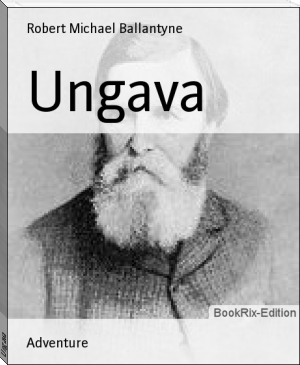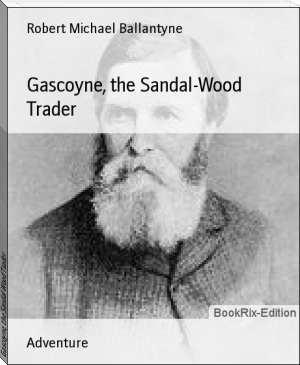Ungava - Robert Michael Ballantyne (distant reading txt) 📗

- Author: Robert Michael Ballantyne
Book online «Ungava - Robert Michael Ballantyne (distant reading txt) 📗». Author Robert Michael Ballantyne
"Come here, Chimo," said Edith, when these symptoms of restlessness had attracted her attention; "what is the matter with you, my dear dog? Surely you are not frightened at the appearance of this wild place! Speak, dog; see, Arnalooa is laughing at you."
Edith might have said with more propriety that Arnalooa was laughing at herself, for the little Esquimau was much amused at the serious manner in which her Kublunat friend spoke to her dog. But Chimo refused to be comforted. He raised his snout, snuffed the air once or twice, and then, descending the gorge a short distance, put his nose close to the ground and trotted away.
"That is very odd of Chimo," said Edith, looking into Arnalooa's face with an expression of perplexity.
As she spoke Okatook pointed, with an eager glance, up the ravine. Turning her eyes hastily in the direction indicated, Edith beheld a deer bounding towards them. It was closely followed by a savage wolf. The deer seemed to be in the last stage of exhaustion. Its flanks were wet with moisture, its eyes starting from their sockets, and its breath issued forth in deep sobs, as it bounded onwards, seemingly more by the force of its impetus than by any voluntary exertion. More intent on the danger behind than on that which lay before it, the deer made straight for the pass in which the three girls stood, and scarcely had they time to spring to the sides of the cliff, when it swept by like an arrow. Instantly after, and ere it had taken two bounds past them, the wolf sprang forward; caught it by the throat, and dragged it to the ground, where in a few seconds it worried the noble animal to death. It is probable that the chase now terminated had begun at early dawn that day, for deer being fleeter than wolves they prolong the chase until overcome by the superior strength and dogged perseverance of their ravenous enemies. Over mountain and hill they had bounded along together, through glen and gorge, across river and lake, bursting headlong through bush and brake, or under the shadow of frowning cliffs, and toiling, at a foot pace and with panting sides, up the steep hills, in the fierce blaze of the sun, the one impelled by hunger, the other by fear, until at length the scene closed in the wild pass, almost at the feet of the three children.
But retribution was in store for the savage destroyer. Ere yet the life's blood had teased to flow from the throat of the dying deer, and while the wolf's fangs were still dripping with its gore, a fierce bark, followed by a terrific growl, rang among the cliffs, and Chimo, with his ears laid back and his formidable row of teeth exposed, rushed up the gorge and seized the wolf by the neck! Thus assailed, the wolf returned the bite with interest, and immediately a fight of the most energetic character ensued.
The wolf was much larger and more powerful than Chimo, but was greatly exhausted by its long chase, while the dog was fresh and vigorous. Once or twice Chimo tossed his huge adversary by main strength, but as often he was overturned and dreadfully shaken, while the long fangs of the wolf met in his neck, and mingled the blood of the deer, which bespattered his black muzzle, with the life's blood that began to flow copiously from Chimo's veins. At this moment a shout was heard farther up the ravine. The three girls turned hastily, and saw, on a point of rock which projected from the mountain side and overhung the dark pool, the figure of a man, of such immense proportions that they instinctively shrank back with terror. The position in which he stood made him appear larger than he really was. The scattered gleams and slant rays of sunshine that played around the spot invested him as with a supernatural halo, while a bright glow of light on the cliff behind detached him prominently from the surrounding shadows. He poised a spear in his right hand, and, while Edith gazed at him in terror, the weapon flew whistling through the air and was buried in the side of the wolf. But so close did the spear pass, that Edith involuntarily stepped back as she heard it whiz. In doing so she lost her balance and fell over the cliff. Fortunately, Arnalooa caught her by the dress and partially broke her fall, but the descent was sufficiently steep and rugged to render the child insensible.
When Edith recovered consciousness, her first emotion was that of terror, on beholding a large, dark-bearded face bending over her; but a second glance showed her that the eyes of the stranger gazed upon her with a look of tenderness, and that Arnalooa and Okatook were kneeling beside her with an expression of anxiety. Had anything further been wanting to allay her fears, the sight of Chimo would have done it. It is true the sturdy dog panted heavily, and occasionally licked his wounds, as he sat on his haunches at her feet; but he was wonderfully calm and collected after his recent mortal conflict, and regarded his young mistress from time to time with an air of patronising assurance.
As Edith opened her eyes, the stranger muttered some unintelligible words, and, rising hastily, went to a neighbouring spring, at which he filled a rude cup with water. In doing this, he revealed the huge proportions of the gigantic Esquimau whom we introduced to our reader in a former chapter. He was dressed in the same manner as when we first saw him, but his face was somewhat altered, and his black eyebrows were marked by that peculiar curve which is expressive of deep melancholy. Returning quickly from the spring, he kneeled beside the little girl, and, raising her head on his broad hand, held the goblet to her lips.
"Thank you," said Edith faintly, as she swallowed a few drops; "I think I had better go home. Is Chimo safe? Chimo!" She started up as the recollection of the fight with the wolf flashed upon her; but the fall had stunned her rather severely, and scarcely had she risen to her feet when she staggered and fell back into the arms of the Esquimau.
Seeing that she was quite unable to walk, he raised her in his powerful arm as if she had been a young lamb. Catching the dead wolf by the neck as he passed, and springing from rock to rock with catlike agility, he bore his burden down the ravine, and strode towards the fort under the guidance of Okatook and Arnalooa.
CHAPTER TWENTY TWO.
MAXIMUS--DEER SPEARING--A SURPRISINGLY BAD SHOT--CHARACTER OF THE NATIVES.
"Hallo! what have we here?" exclaimed Stanley, starting from his seat in amazement, as the giant entered the hall of Fort Chimo--his left hand grasping a blood-stained wolf by the throat, and Edith resting in his right arm.
At first the startled father imagined his child must have been wounded, if not killed, by the savage animal; but his mind was immediately relieved on this point by Edith herself, who was no sooner laid on her bed than she recovered sufficiently to narrate the circumstances attending her fall.
"Well, Maximus," said Stanley, returning to the hall and applying to the bulky savage the term that seemed most appropriate to him, "shake hands with me, my good fellow. You've saved Chimo's life, it seems; and that's a good turn I'll not forget. But a--. I see you don't understand a word I say. Hallo! Moses, Moses! you deaf rascal, come here!" he shouted, as that worthy passed the window.
"Yis, mossue," said Moses, entering the hall. "Oh, me! what a walrus am dis! Me do b'lieve him most high as a tree an' more broader nor iveryt'ing!"
"Hold thy tongue, Moses, and ask the fellow where he came from; but tell him first that I'm obliged to him for saving Chimo from that villainous wolf."
While Moses interpreted, Arnalooa and Okatook, being privileged members of the tribe, crossed over to Edith's room.
"Well, what says he?" inquired Stanley, at the end of a long address which the giant had delivered to Moses.
"Him say he heered we have come to trade, from Eskeemo to west'ard, and so him come for to see us."
"A most excellent reason," said Stanley. "Has he brought any furs?"
"Yis; him brought one two fox, and two t'ree deer. No have much furs in dis country, him say."
"Sorry to hear that. Perhaps his opinion may change when he sees the inside of our store. But I would like him to stay about the fort as a hunter, Moses; he seems a first-rate man. Ask him if he will consent to stay for a time."
"P'raps he fuss-rate, p'raps not," muttered Moses in a disparaging tone, as he turned to put the question.
"Him say yis."
"Very good; then take him to your house, Moses, and give him some food and a pipe, and teach him English as fast as you can, and see that it is grammatical. D'ye hear?"
"Yis, mossue, me quite sure for to teach him dat."
As Moses turned to quit the hall, Stanley called him back. "Ask Maximus, by-the-bye, if he knows anything of a party of Esquimaux who seem to have been attacked, not long ago, by Indians in this neighbourhood."
No sooner was this question put than the face of Maximus, which had worn a placid, smiling expression during the foregoing conversation, totally changed. His brows lowered, and his lips were tightly compressed, as he regarded Stanley for a few moments ere he ventured to reply. Then, in a deep, earnest tone, he related the attack, the slaughter of his people, their subsequent escape, and the loss of his bride. Even Moses was agitated as he went on, and showed his teeth like an enraged mastiff when the Esquimau came to speak of his irreparable loss.
"Stay one moment," said Stanley, when Maximus concluded. "I have something to show you;" and hastening into his room, he quickly returned with the little piece of sealskin that had been found at the deserted Indian camp. "Do you know anything of this, Maximus? Do you understand these marks?"
The Esquimau uttered a cry of surprise when his eye fell on the piece of skin, and he seemed much agitated while he put several quick, earnest questions to Moses, who replied as earnestly and quickly; then turning rapidly on his heel, he sprang through the doorway, and was soon lost to view in the stunted woods of the ravine above the fort.
"That fellow seems in a hurry," exclaimed Frank Morton, entering the room just as the savage made his exit. "Who is he, and wherefore in so great haste?"
"As to who he is," answered Stanley, "I'll tell you that after Moses has explained the cause of his sudden flight."
"He say that him's wife make dat skin, and de arrow on him skin show dat de Injuns take her to deir tents."
"But did you not tell him that we found the skin long ago, and that the Indians must be far, far away by this time--nobody knows where?" demanded Frank.
"Yis, me tell him. But he go





Comments (0)